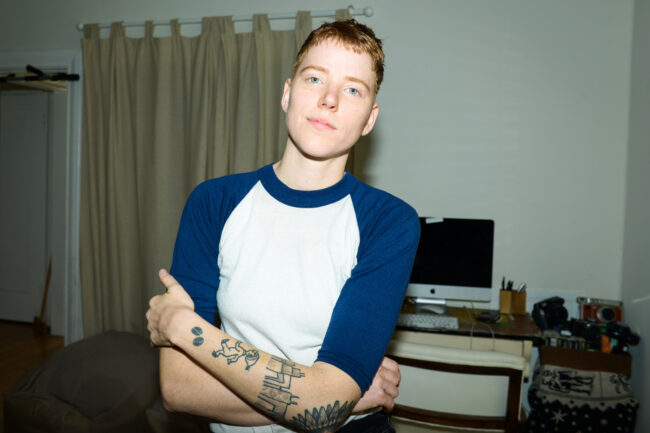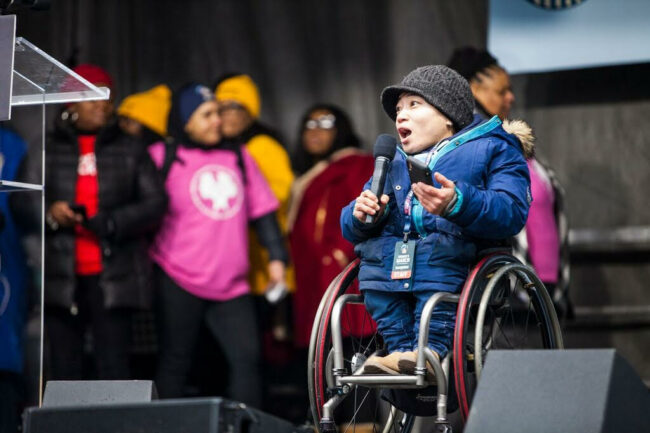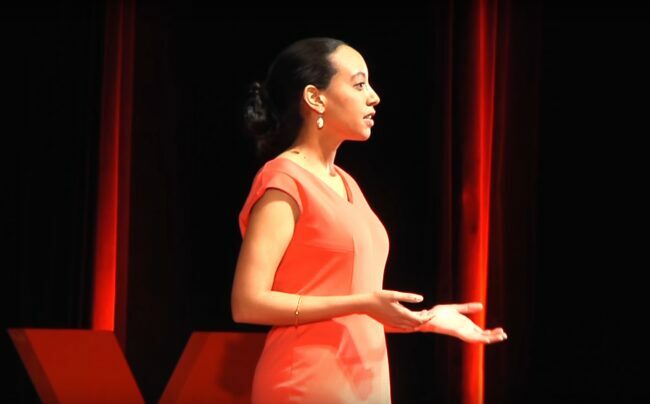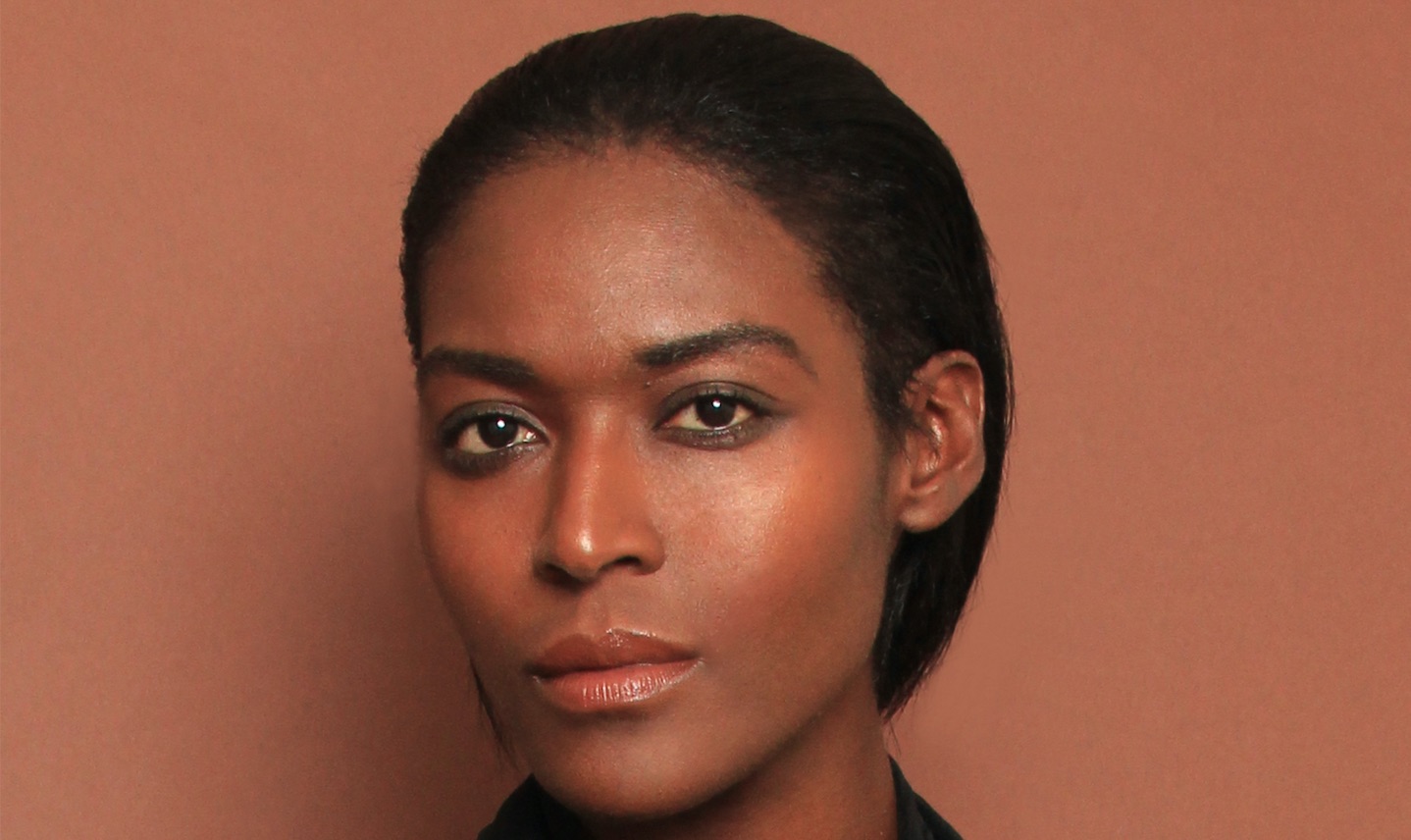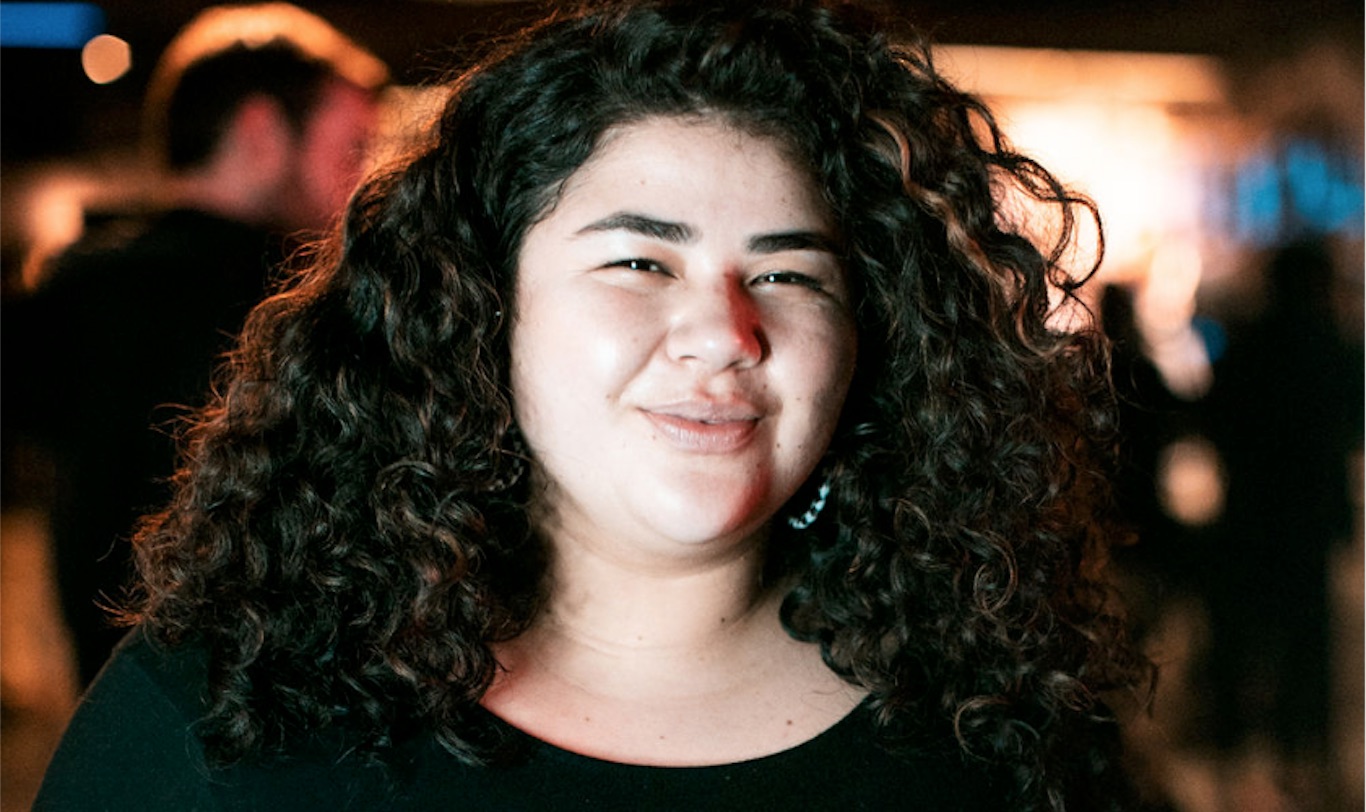
This article is part of an exciting series we launched in 2018 called Today’s Wonder Women – designed to celebrate the inspiring, impactful, empowering and extraordinary things ordinary women are doing every day. Over the coming months we will be sharing interviews, essays, articles and guest postsabout women who are creating change. If you have a story to share and want to add your voice to the Today’s Wonder Women conversation, get in touch by emailing info@girltalkhq.com.
We are in the business of championing the lives and stories of women and girls the world over, and every now and then we meet someone who is doing so many extraordinary and inspiring things in their community, that we are reminded of why we do what we do.
Los Angeles-based Charity Chandler-Cole is one of those women who we know for sure is destined for greatness, the kind of greatness that will change lives forever. In fact, she already is changing the world around her. She is a wife, mother to 5 children, and has a list of titles and accomplishments that make you wonder how she hasn’t had to clone herself to pursue.
At 32, Charity is the president of the Black Los Angeles Young Democrats, Director of Contracts Administration for the Aids Health Foundation, a founding board director for the Anti-Recidivism Coalition, the organization founded by Hollywood producer Scott Budnick (‘The Hangover’), Criminal Justice Reform Leader, and foster youth activist. She has run for local office in South Central Los Angeles (Gardena City Council and the 62nd Assembly District Delegate) and we predict her political aspirations will take her all the way to the top! Speaking of which, in 2016 Charity spoke at the White House about women and the criminal justice system.
Her journey to where she is today, like many great stories, didn’t always start out in the most positive way. Throughout her life she has experienced being part of the largest child welfare system in the United States, sexual abuse, poverty, being part of a gang for survival, having to be a caregiver to her younger siblings while she was only a child herself, teen pregnancy, juvenile detention and a general feeling that she was never going to be anything great.
Not only did she defy her critics and the status quo stereotype, today Charity is the living embodiment of a real life Wonder Woman, using all her energy and time to ensure other at-risk girls like her will get a chance to live their best and most successful life filled with health, love and happiness. We spoke to Charity to learn more about her incredible story and the work she is involved in today.

Your story is the kind of journey that reads like a movie script: battling difficulties to triumphing over your circumstances. Tell us about your upbringing in Los Angeles and family environment?
My upbringing and family environment started off normal, at least to me in my very small, boxed world at the time. I was born to a family with married God-fearing parents who loved me dearly, an older sister and without a care in the world. I’m the 2nd oldest of six children, which my parents had in an eight-and-a-half-year period, 4 girls and 2 boys, in that order (dad really wanted a boy). My father was a deacon and minister in the church and my mother sung her heart out in the choir every Sunday, I’m pretty sure we spent more time at church than at home.
I was raised with good principles and a foundation set in being respectful and getting good grades. My father worked on planes at Boeing while taking classes at the Computer Learning Center, and my mother was a cashier at Vons. Both attempted college, but neither finished. Despite the normalcy of what our life probably appeared to look like, my parents weren’t happy and fought almost every day.
The normalcy of my life quickly changed at the age of ten resulting in a divorce and my mother raising six kids on her own while battling breast cancer. The seven of us moved from a nice house in Carson to a 1 bedroom and a loft apartment in Hawthorne. I don’t know if it was the cancer or the stress of raising six kids and going through a divorce, all in the same year, but my mother’s mental health started to fade and the screaming and yelling that was normally directed at my dad, now came raining down on us kids. Despite the chaos, I remained by my mothers’ side and did what I could to support her, especially since the doctors shattered my tiny world by telling us that mom maybe had a year left to live.

Fortunately, my mother kicked cancers ass (this time) and lived for another 21 years. With cancer and the divorce now behind us, we faced new challenges, which were always there but not obvious to me until I turned about 10 years old. We were poor, on welfare and I was the butt of every joke at school for being dirty, clothes never ironed and their favorite “food stamp” girl. School, which was once an enjoyment and escape, became a nightmare because of the kids taunting me. My role as a 12-year-old girl turned into that of a 12-year-old care giver, with my oldest sister now having experienced juvenile hall and foster care and my mother’s interest in being a parent slowly fading. This is where the real journey began.
As a young girl you experienced things that no ordinary person would think they could survive: sexual abuse, foster care, incarceration, and gang involvement. Tell us about those experiences and how they shaped who you are today?
Well, our Section-8 finally kicked in and we moved to West LA to a gang-infested neighborhood where I was forced to either pledge my allegiance to protect my four younger siblings or the five of us being terrorized everyday while walking to school, parks or corner stores. By the age of 14, I was a bonafide gang member and drug dealer, ditching school every day to sell weed on corners, “ditch parties” at other kids houses, or even the security guard at my school. I had a boyfriend who was also 14 who was trying to find his place in our circle and being tall, light skinned with green eyes and fresh cornrows every day, he was looked at as the “man,” except for one unacceptable secret he was keeping – he was still a virgin.
A few of our neighborhood friends found out and he was now tasked with “becoming a real man,” which unfortunately made me a target. We never talked about sex, I definitely wasn’t interested, and I began to fear this new aggressive, mean version of my boyfriend who would not leave me alone about it. I would stop answering the house phone, (we didn’t have cell phones just yet) and I would take different routes to school and eat my lunch in the classroom just to avoid him.
One day while walking home, I saw him walking out of the “cut” which is basically a walkway between apartment buildings that normally led out to an alley. I was with a group of other kids from school, all walking home together, and he was with his friends. It would have been too obvious to turn and walk away, so I greeted him as if I hadn’t been trying to avoid him.
He grabbed my arm with force and threw me to the ground, proceeding with pinning me down with his knee, my cheek now getting acquainted with the rocky asphalt. He wanted everyone to know that the delay of his “manhood” was no fault of his own and that day, bruises, fighting and all, he had his way with me, and from that day on, I gave up fighting any and all sexual abuse, chopping it up to being a part of my destiny as a young black girl growing up in the hood.
Two years later, after getting expelled from school for selling drugs to the security guard, I found myself in handcuffs for stealing underwear and a T-shirt from Ross. We were still poor, and having been threatened with jail for selling drugs, I moved on to petty theft and selling batteries for CD players and all sorts of candy at school to provide for my siblings and myself. Mom couldn’t afford to take care of us, providing not even the bare minimum at times, but she tried. And getting bullied and harassed for being poor and dirty was no longer an option nor tolerated.
Being handcuffed and walked through a store by two police officers was at the time, the most humiliating moment of my life. Because it was a petty theft case, they normally just call your parent to pick you up and give you a citation. My mother however, told them to take me to jail, and they did. My heart was broken. Aside from getting kicked out of school, my mother had no knowledge of my other offenses, I never had incidents involving the police, never been arrested and literally provided for our family, giving her money, buying groceries and putting clothes on my siblings’ backs.
From there I spent the next two years between juvenile halls and group homes, now a ward of the court and lost in a system that did not give a shit about me. My experience in the system was horrid and I experienced things no child my age should have had to. From the daily verbal degradation from officers, witnessing little girls getting locked up for being sexually violated by grown men, or as the system put it, “prostitution,” temporary blindness from being pepper sprayed, over medication and fights, to third grade level classes that set you back academically, the list goes on.
The worst part was being sexually exploited in my group home, where we were basically sold to the highest bidder for street level prostitution, or for the prettier girls, pornography. At this point, I was so numb to the world that I could have died or spent the rest of my life in jail. I had accepted the fact that my life had no meaning, that I was put on this earth to suffer and that no one loved me.
So, when I became the new victim of this hellish, secret group-home sex exploitation scandal, I simply followed orders and occasionally even enjoyed the long rides, away from our dark, eerie group home, watching the trees and free people, to whatever sick fate that was awaiting me. These experiences turned me from a well-mannered preachers kid that prided herself on getting straight A’s and winning spelling B’s, to a cold-hearted, mean, insecure and lonely person that hated the world and everyone in it.
There are so many studies showing the abysmal statistics surrounding foster youth, especially foster girls. Yet you have proven that it often takes just one person, a mentor or someone who cares, to change the course of a vulnerable person’s future. Who changed your life?
I believe wholeheartedly in the power of mentorship and its ability to cultivate greatness out of our most vulnerable people. I however, wasn’t fortunate to have a mentor. I wish I had. But it did take just one person to change my life and it was my son. Right before I turned 18 years old and having been sentenced to another 6 months in foster care, despite my aging out soon, I ran away.
I was able to tolerate the sexual abuse knowing that I would be free soon and could disappear, but six more months was not an option for me, so I ran. I ran, turned 18 and got pregnant right away. I was an appointment away from getting an abortion from a free clinic that came highly recommended because they didn’t ask questions, when my new boyfriend insisted that we keep it.

I was reluctant, especially since I didn’t like him like that, but seconds later his mother and sister pulled up and he proudly announced the news to two people I have never seen or met in my life. Their reactions weren’t bad, they weren’t angry, a little puzzled and confused, but they accepted and embraced me without doubt or question. This acceptance, in some weird way, gave me a sort of comfort to have this baby, and my boyfriend stating loudly in front of them that I must move in today, also made me feel like I now had a home.
Up until this point I was couch surfing, sleeping in friends’ cars and on one occasion, the park. I was as homeless, but I now had a home. There was still one problem – who was I to bring a life into this world to suffer the same fate I had? I had a warrant out for my arrest for running away and if I had this baby and got into any trouble, they would take him from me. So I immediately turned myself in, did a few weeks in county jail, telling no one my secret and hiding my nausea and vomiting the best I could.
I didn’t trust the justice system with my secret. I knew they would find some way to steal my joy. Not this time. When I got out, I made a promise to my unborn child that he would not experience the life I did, and this little fetus became the beam of my existence and changed my life forever. I now had something to live for. Someone that needed me and would love me, unconditionally. It was a feeling I had never experienced. From here on, there was no place but up and I came unapologetically for everything the world said I couldn’t have.

As a young mother you completed grad school, no easy feat even for those who aren’t parents yet! What kept you motivated to finish your education despite juggling so much at a young age?
By the time I started grad school, I accomplished graduating in the top 2% of my class from Loyola Marymount University and was nominated for valedictorian, obtaining legal guardianship of my nephew whose mother had him at 15 years old and unfortunately was dealt a terrible hand as well. And I was also now pregnant with a set of twins and engaged to the love of my life. My children kept me going, and the more I had the more I needed to accomplish.
I thrived under pressure and having lived in chaos for so long I was able to successfully juggle working full-time, going to school full time and never missing a field trip, performance or parent meeting. It was hard, don’t get me wrong, and I wanted to give up almost every day, but seeing their little faces gave me strength.
Knowing that my kids would grow up having resources, access and the ability to be whatever they wanted with parents that supported them meant the world to me. I could not fail them, it wasn’t an option. I also knew that I wasn’t alone. I knew there were hundreds of girls like me who gave up, felt defeated and unworthy and were content with just living and dying, with no greatness or success in between.
I wanted to give hope to these people; and because I didn’t have a mentor, and because I wasn’t at the time aware of any successful Black women from my neighborhood or community who has been to hell and back and still managed to succeed, I wanted to create what that looked like. So, I just worked my ass off and allowed greatness to manifest and take form in whichever ways God saw fit. I didn’t have a plan or road map, but I knew it wasn’t an option to fail, so I persevered.

Prison reform is a big topic of discussion politically these days, especially given the knowledge that the rate of women in prison is growing faster than men. This impacts families and children in a big way. What do you think are some of the ways we can change this problem?
Yes, prison reform is a big topic now, which I’m grateful for, although prison abolishment, in my opinion, should be the focus. When women and girls are incarcerated, in shuts down the family at its core. Children lose mothers, and in majority of cases single mothers. Kids are now forced into the foster care system without proper guidance, love or resources. Reunification is sometimes impossible, and a new generation of kids are born whose parents were/are in a system of some sorts and all statistically destined to fail. Its all one sick cycle that is perpetuated by violence, sexual abuse and profit.
When women offend, it is usually out of a need to survive. It could be stealing to feed themselves or their children, “prostitution,” (and I put that in quotes because that’s the term our justice system currently uses, it’s really sexual exploitation) or because they are defending themselves against violence and/or sexual abuse, to name a few. Every little girl has plans of growing up and being a mommy, princess, actress, or whatever their little hearts imagine. We do not just wake up one day and say, “I think I’m going to go sell drugs today or find someone to sexually violate me, or take the rap for my boyfriend, or hurt someone defending myself.”
We are all products of fucked up situations and our elected officials and people in authority need to recognize that and be very intentional in finding solutions to address this, starting by looking at the inescapable domino effect of incarcerating a mother or caregiver and providing help support and resources to women and girls who are victims, not criminals.

Tell us about the work you are doing today though the Anti-Recidivism Coalition?
I am currently the Chairwoman of the Board of Directors for ARC, and we are a community organization that believes that every individual should have a chance to thrive and a have shot at redemption. Our goal is to reduce recidivism by creating hope, positive cultural changes, support, mentoring, housing, jobs, education and vital policy advocacy that helps to change the laws that impact our most vulnerable communities.
What’s unique about our organization is that it was created to be run and operated by those formerly incarcerated, putting our money where our mouth is. In 2019 we plan to put an emphasis on women and girls, understanding that the needs and circumstances are much different from those of men.
You are also a passionate advocate for foster youth and previously ran to lead the largest local child welfare system in world: the Los Angeles County Department of Children and Family Services (DCFS). Although they role was given to someone else, what was your motivation for seeking this position?
My passion was to see not just change, but a complete breakdown, tearing it up and starting a failed system over again. DCFS is in a unique position to cultivate and create the next generation of leaders and change agents, but instead it’s feeding and lining the pockets of prisons by failing our kids and creating the next generation of inmates. In California, up to 70% of inmates in prison are former foster youth.

That is not only a shame, but a testament to a failed system that was put in place to protect, nurture and save kids from abuse and neglect. We can’t strip children from parents for neglect and abuse and neglect and put them in a system that further abuses and neglect them by not educating them properly, not providing them adequate resources and access, compounding their trauma with the harsh reality of a distorted system and not following through to see them succeed. We have to do better, and currently, we’re not even close.
With so much conversation around sexual harassment and assault thanks to the #MeToo movement, how do you hope the conversation will include vulnerable youth like Foster girls?
There are two sides to this. There are the youth that were produced as a result of sexual violence through rape and child sexual exploitation, and for various reasons ended up in the foster care system. There are the youth who are targets because of their vulnerability, and then there are those that fall in both categories. When we (foster youth) are sexually violated, no one thinks twice about it, it’s our fault and part of the automatic package of stereotypes we are immediately given that range from “unworthy” to “criminal”.
The conversation must include foster youth, boys and girls alike, and it must target those that not only seek to exploit us sexually, but also those who profit off our pain and suffering. This includes administrators, care-givers who sell children for sex, pimps, employers, schools, and pedophiles. The system calls them “Johns”.
Isn’t it crazy that the victims are called “prostitutes” while perpetrators are named “Johns”? The second side is that foster youth are immediately treated differently than other youth in most cases, and not for the better. They are now disposable, easily discarded and forgettable. But we matter.
You have already been through so much and achieved so much, and you are only 32. Where do you see yourself in 5 and 10 years from now?
Honestly, I stopped planning my life because God always has different plans than I do! I went to college to be a lawyer, maybe have one kid via IVF and definitely be too busy to marry, unless he was very special and not clingy. I never thought I would have 5 kids, be married, to a lawyer at that, run for office one day, start my own business, or sit on boards of very meaningful organizations. I know that whatever I do it will be grand and will probably take a very big platform to have maximum impact.
I have the ability to inspire and motivate thousands of people with my story. The goal is really just peace and happiness for me and my family, and that’s impossible if others around me are suffering and I keep my mouth shut. So I’ll keep yelling from rooftops and saying uncomfortable things to make people uncomfortable and force accountability, in whatever setting and on whichever platform.
If there was one thing you could tell your younger self about the struggles you endured, what would it be?
I would tell her to not give up, that it’s OK to say no, and that people do make it out of this life, they just don’t come back to talk about it. I wish back then that I knew I was worthy of life and love, and that it was going to be hard, but I was going to survive it and come out strong. Had I known this, I wouldn’t have given up so easily, as many of us do. I would have planned for a future that didn’t involve having to explain, assure and convince future boyfriends that I really liked or loved in college and my adult life that I was actually a victim of sexual violence and not a criminal or a whore. But I would also tell her to transform her trials into testimonies and use them to help others that are just as vulnerable, and not be a victim, but a survivor.
For those who are reading this and can identify vulnerable youth, especially girls, in their life and don’t know how to help them, where would you encourage them to start?
I would recommend finding a local community organization that is specifically geared to help young girls. I hate to say this but sometimes the obvious people and places, such as schools or even public safety, are not the answer because we are not treated fairly or taken seriously. There are always the few that truly care so if you’re lucky enough to know one, then by all means lean on them.
But what we really need is a network of our peers that understand, have navigated life and the systems, and can offer meaningful solutions based off shared experiences. There are also amazing organizations such as the National Foster Youth Institute, Foster Wise, Fostering Change Network and Beyond Foster Care that are good starts.
Finally, what makes you a powerful woman?
What makes me a powerful woman is that I am an angry Black woman. Yes, I am reclaiming this stereotype in every sense of the word. I am angry at our failed systems, I am angry that I was failed, violated, chewed up and spit out by the world and I am angry that my children are growing up in a world that refuses to change. This anger ignites and fuels my ability to advocate for myself and others and to do so, professionally, passionately and unapologetically.
You can learn more about Charity by watching her TEDx Talk below:











